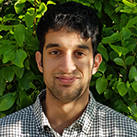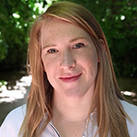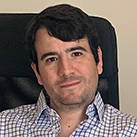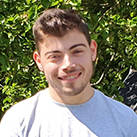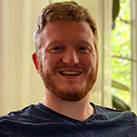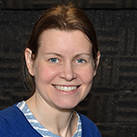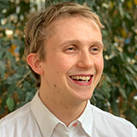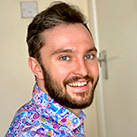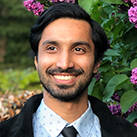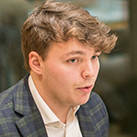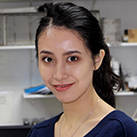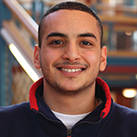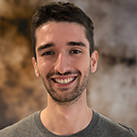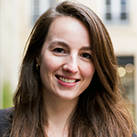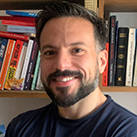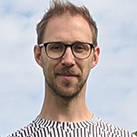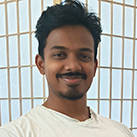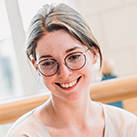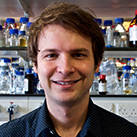Meet our EnterpriseTECH STAR 2020 cohort
Dr Anna Albiero
Postdoctoral Research Associate, Science for Policy Centre, Department of Sociology. University of Cambridge
Node is an online platform that facilitates technical skills and tech exchange and offers a market place where scientist and companies offer their technical expertise or products. Node plans to be the go-to marketplace for STEM research and development, bringing the gig economy to the biotech startup world.
Marco Caballero
PhD student, Department of Computer Sciences, University of Cambridge
Based on his research in self-organising wireless networks, Marco intends to build and commercialise a communication system for drone-swarms that can leverage his innovative networking algorithms to produce larger and more stable fleets of unmanned aerial vehicles.
Jake Cridge
PhD student, MRC Cancer Unit, University of Cambridge
Tumour-draining lymph nodes (TDLNs) contribute towards immune dysfunction in cancers, but their potential as a therapeutic target has been ignored. Preliminary findings suggest regulatory T-cells (Tregs) are functionally altered within TDLNs, but existing global Treg depletion strategies have failed.
Ruben Drews
PhD student, Cancer Research UK, Cambridge Institute, University of Cambridge
Unmet needs prevail in the deadliest cancer types such as ovarian, pancreatic or oesophageal cancer. Their poorly understood genomic instability makes effective treatment prediction difficult. With his computational method, Ruben seeks to provide clinicians with means to predict drug responses in those patients successfully and cost-effectively.
Dr Caroline Fabre
Postdoctoral Research Associate, Department of Zoology, University of Cambridge
Climate-change has already affected the growing season and altered rainfall patterns increasing the challenge to limit wastage and fight pests. Several insects that use seismic signals during reproduction are recognised as important pests. Caroline aims to develop devices that will efficiently and specifically disturb seismic communication and reproduction of these pests, and will progressively replace the use of conventional.
Ryan Greenhalgh
PhD student, Department of Physiology, Development, and Neuroscience, University of Cambridge
The outbreak of coronavirus has shifted the working paradigm from office to online. Video conferences can be contaminated with unwanted noise and it can be challenging for groups to have a natural conversation. Focal aims to develop a mobile application that can separate out conversations to make the noisy world clear again.
Filip Hrnčiřík
PhD student, Department of Clinical Neurosciences, University of Cambridge
Although cochlear implants are transformative in their capability to restore hearing, their indications are currently severely limited by insertion-induced trauma. Filip is developing an insertion tool that would help surgeons to minimise this trauma and preserve the recipient’s residual hearing.
Hassan Imran
PhD student, Department of Engineering, University of Cambridge
Soot from industrial combustion processes is the second most important contributor to global warming. Hassan is developing an ultra-low-cost, miniaturised soot sensor developed for deployment in environmental monitoring networks. Utilising a mass-produced quartz-tuning fork crystal, his photoacoustic sensor is estimated to cost 12 times less than commercial, gold-standard instruments.
Nathan Jay
PhD student, Department of Engineering, University of Cambridge
Nathan’s company Neurowire, seeks to commercialise novel neural interfacing sensors that enable the communication between electronic devices and the human nervous system. Neural interfaces are used in medical devices designed for treating neurological disorders such as Parkinson’s disease or epilepsy. By commercialising modern neural interfacing sensors, Neurowire aims to disrupt a £2 billion global market saturated with 30-year old technology.
Zijing (Liz) Li
PhD student, Department of Engineering, University of Cambridge
AutonomiCity is a start-up powering the smart infrastructure of tomorrow. It creates a self-healing system in concrete, using recycled plastic and 3D printing technique. This solution is at the forefront of solving the plastic crisis and extending structures’ lives.
Maait Yousef
Fourth Year Medical student, University of Cambridge
Biotech is a neuroimaging technology which utilises the properties of stable hyperpolarised stable isotope labelled compounds for the detection of Parkinson’s disease using MRI. By targeting specific receptor biomarkers in the brain, these labelled drugs would provide early and more accurate detection of the disease, whilst also avoiding the carcinogenic effects of radiolabelled compounds currently used in neuroimaging.
Peter Pedersen
PhD student, Exoplanets Research Centre, University of Cambridge
Open-seneca: creating a global, mobile, air pollution sensor network. Enabling the individual to measure their personal exposure to pollutants. Presenting new opportunities to enable and engage the individual, and to drive the behavioural change needed to improve our environment, and to inform policy.
Marion Perrin
PhD student, Wellcome-MRC Stem Cell Institute, University of Cambridge
Baby clothing is disposable by nature. But what if we could offer a more sustainable option to parents? The Adjustables is a clothing brand where garments can grow at the same pace as kids do, thanks to the combination of smart seams with pattern tricks.
Ioannis Prattis
PhD student, Department of Engineering, University of Cambridge
The development of a novel a POC platform for HIV detection that enables “sample-in/answer-out” devices for rapid and affordable molecular diagnostics tests in developing countries. The platform aims to convert the traditional optical signals of PCR method into electrical.
Dr Tom Swinfield
Postdoctoral Research Associate, Department of Plant Sciences, University of Cambridge
We need a way to protect and restore forests to mitigate climate breakdown. Tom’s business designs sustainable investments into forest landscapes – combining restoration pledges and carbon finance with financial technologies and remote sensing. His business will disrupt the paradigm that growing forests comes at the expense of local economies.
Raghul Parthipan
PhD student, Department of Earth Sciences, University of Cambridge
The number of people lifting weights is exploding. From those lifting casually for health or for enjoyment, to those lifting competitively. We are creating an artificial intelligence-powered app providing objective, biomechanical analysis that anyone can use to lift weights safer, get stronger and be healthier.
Carolin Sauer
PhD student, Cancer Research UK Cambridge Institute, University of Cambridge
Ovarian cancer is characterised by poor disease outcome due to the lack of targeted therapies and our inability to stratify patients for suitable treatment. My aim is to use gene expression signatures from low-cost, high-throughput RNA profiling to better predict treatment response and inform clinicians of most suitable treatment choices for patients suffering from ovarian cancer.
Grant Simpson
PhD student, Department of Chemistry, University of Cambridge
I developed a novel chemical architecture that serves to address the two main problems that blight the treatment of cancer: selectivity and resistance. The technology selectively targets cancer cells, overcoming off-target toxicity of therapeutics lacking selectivity. Furthermore, by releasing multiple drugs in the process, drug-resistance is prevented.
Apply
Applications portals for students, inventors and supervisors are closed and will reopen on 24 April 2023.
EnterpriseTECH Cohort 13
Michaelmas 2023 (60 students, 10 projects)
EnterpriseTECH Cohort 14
Lent term 2024 (60 students, 10 projects)
EnterpriseTECH STAR IV
Easter term 2024 (20 students)


